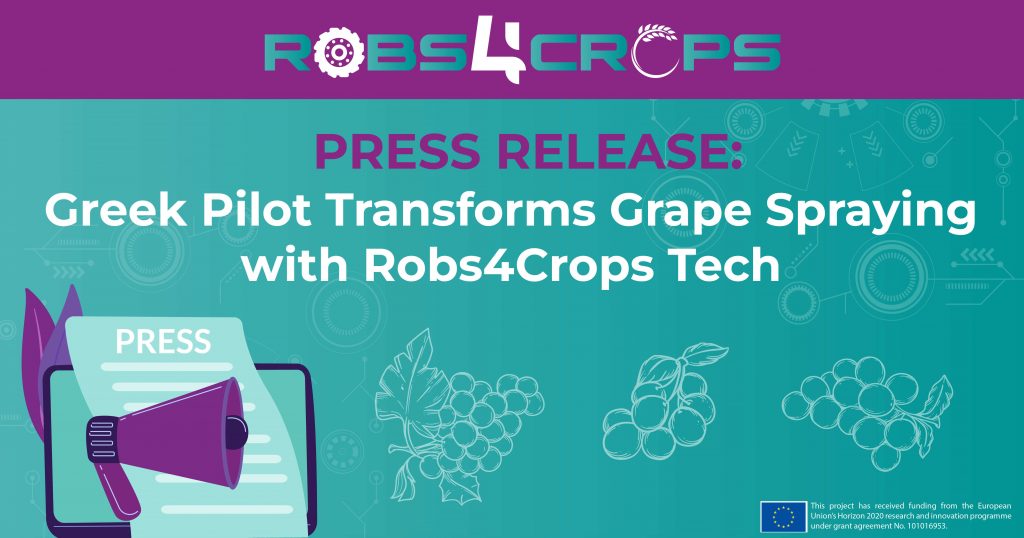The Robs4Crops project, a four-year Horizon 2020 initiative, has successfully concluded, advancing sustainable agricultural practices with cutting-edge robotic technology. The collaborative effort brought together 16 partners across eight European countries to develop smart implements, autonomous vehicles, and advanced planning software, streamlining key farming processes while reducing dependence on human labor.
The project included large-scale pilot programs across Europe in diverse settings such as vineyards, arable fields (sugar beets, pumpkins), and apple orchards in Greece, France, Spain and the Netherlands. These pilots demonstrated innovative applications of robotics for tasks like mechanical weeding and precision spraying, highlighting their potential to revolutionize sustainable and efficient farming practices.
Key Success: Transforming Table Grape Spraying in Greece
In Greece, a pilot project demonstrated how autonomous technologies can transform table grape production by addressing challenges such as quality, pest control, and labor-intensive spraying in grape farming. The goal was to effectively deal with high labor costs and accessibility issues. The pilot employed retrofitted tractors equipped with advanced tools like smart nozzles, perception units, and terminals for allowing farmers to set and adjust parameters for spraying sessions, as well as CEOL robots for autonomous navigation and spraying applications, as well as weeding.
The advanced technology was further aided by the Farming Controller, an open-source digital twin software for planning, scheduling, and optimizing agricultural production by coordinating robots, implements, and machinery.
“The pilot progressed smoothly, successfully completing spraying across multiple plots,” said Thanos Dritsopoulos from Pegasus Agrifood Coop-7 Grapes. “About 10 spraying passes were conducted across one field in 2024 alone. Overall, 40% less spraying liquid was used when compared with the conventional approach. Additionally, we involved local farmers, more precisely innovative farmers through phased expansions.”
The pilot covered several key plots, including Boutsiokos field (0.48ha), and Mpoutsioukos Vineyard (0.5ha), with a variety of environmental and technological assessments. Furthermore, the pilot hosted interactive demonstrations that attracted nearly 100 participants, providing a platform for hands-on learning, knowledge exchange, and collaboration with members of the broader agricultural community.
Next Steps: Advancing Innovation and Sustainability in Agriculture
Moving forward, Robs4Crops will focus on scaling the adoption of robotic technologies across European farming systems by supporting commercialization and forming partnerships with agricultural stakeholders. Efforts will center on facilitating knowledge exchange, providing training to farmers, and promoting hands-on learning to ensure smooth integration of spraying innovations. Additionally, the project will continue research to refine robotic technologies, enhance sensor capabilities, and explore AI-driven solutions. These actions will ensure the long-term impact of the project by advancing sustainable, efficient, and environmentally responsible farming practices.
Collaborating Partners
The pilot brought together key partners to deliver its success, including Pegasus Agrifood Coop-7 Grapes, Agricultural University of Athens, Teyme, University of Copenhagen, and Fundacio Eurecat. These organizations played vital roles in supporting technological innovation, operational deployment, and research insights that contributed to the pilot’s achievements.
For more information on Best Practices and Lessons Learned from the four pilot projects within Robs4Crops, visit: robs4crops.eu/trials.

